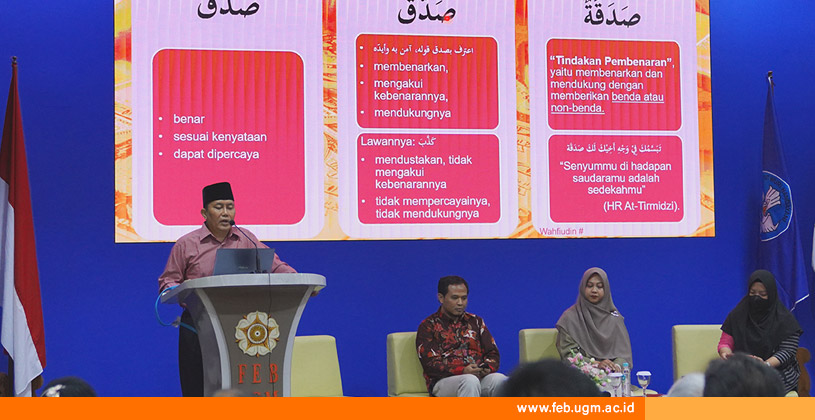Islamic Social Finance as a Foundation in Building the Nation and State
- Details
- Written by Kirana
- Category: News
- Hits: 1126

Center for Accounting and Regulatory Studies (PAKAR) Accounting Laboratory, Department of Accounting, Faculty of Economics and Business Universitas Gadjah Mada (FEB UGM) in collaboration with the Djalaluddin Pane Waqf Foundation held a National Seminar with the theme “Philanthropy and Empowerment through Islamic Social Finance” on Tuesday (27 /09). The seminar was held at the Auditorium Lt. 8 Learning Building FEB UGM and attended by students, lecturers, researchers, practitioners, and the general public. The seminar on this occasion aims to disseminate knowledge related to Islamic Social Finance through philanthropic practices and various forms of endeavor to introduce the importance of waqf and zakat.
The number of Islamic philanthropic institutions in Indonesia that have been established shows rapid development in philanthropic practices and this has an impact on improving the management of zakat and waqf which can be one of the potentials for empowering the people. The point was conveyed by Prof. Dr. Didi Achjari, M.Com., Ak., CA., as the Dean of FEB UGM, in his remarks that opened the seminar. In this event, there were three speakers present, namely KH. Wahfiudin, M.B.A., as Deputy Chair of the Central MUI Education and Cadreization Commission, Vicki Erlina Septiviana, as Regional Coordinator of FOSSEI DI Yogyakarta, and Taufikur Rahman, M.B.A., as Lecturer of the Accounting Department FEB UGM and Director of RZIS UGM.
As the first speaker, KH. Wahfiudin, M.B.A., provides a comprehensive explanation of shadaqah and infaq. Based on his explanation, infaq is a distribution of wealth or spending (expenditure) of property in the way of Allah (infaaq fii sabilillah). Meanwhile, shodaqoh is defined as a gift based on faith that is not limited to wealth. According to him, in this world there must be a distribution and circulation of wealth, lest wealth only circulate among wealthy people. He added, for those who hoard their wealth and do not distribute it in the way of Allah, there will be a painful torment that awaits.
The event continued to the second speaker, namely Taufikur Rahman, M.B.A., who discussed topics related to student empowerment through the ZIS House on the UGM campus. Taufikur explained about philanthropy in Islam, where zakat, kafarat, and fidyah are things that must be fulfilled to be distributed to eight mustahik asnaf. In addition, he also explained about the mission and vision of the UGM ZIS House, which is the UGM Zakat Collecting Unit, in managing and distributing various benevolent funds for the UGM academic community and the surrounding community in need.
Next was a topic discussion session from the third speaker, Vicki Erlina Septiviana, titled as “The Role of Students in Empowering Islamic Social Finance.” Vicki explained that Islamic Social Finance is a financial instrument that can be in the form of zakat, infaq, shadaqah, waqf, and so on. According to her, Indonesia as the largest Muslim population in the world, supported by student human resources who are engaged in zakat waqf, can encourage Indonesia to improve to become a developed country by strengthening productive ZISWAF and generating creative ideas in empowering ZISWAF.
Reportage: Kirana Lalita Pristy.


